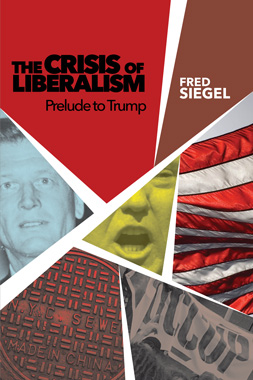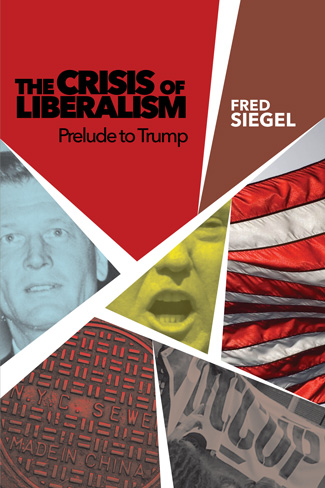By Telos Press · Monday, October 19, 2020 Writing at the Wall Street Journal, Tunku Varadarajan profiles Fred Siegel, author of The Crisis of Liberalism: Prelude to Trump, now available from Telos Press Publishing. Order your copy in our online store and save 20% by using the coupon code BOOKS20 during checkout. Also available in Kindle ebook format from Amazon.com.
An excerpt:
 . . . Mr. Siegel traces the origins of the “present-day contempt” for the middle class back a century. He cites H.L. Mencken’s demeaning of the bourgeoisie, in the celebrated editor’s coinage of “booboisie.” Mr. Siegel has written extensively on Herbert Croly, the political philosopher and co-founder of the New Republic, as well as on the novelists H.G. Wells and Sinclair Lewis (who, in 1930, became the first American to win the Nobel Prize for Literature). These three men, Mr. Siegel says, laid the foundation for an elite revolt against the American middle class that endures to this day. . . . Mr. Siegel traces the origins of the “present-day contempt” for the middle class back a century. He cites H.L. Mencken’s demeaning of the bourgeoisie, in the celebrated editor’s coinage of “booboisie.” Mr. Siegel has written extensively on Herbert Croly, the political philosopher and co-founder of the New Republic, as well as on the novelists H.G. Wells and Sinclair Lewis (who, in 1930, became the first American to win the Nobel Prize for Literature). These three men, Mr. Siegel says, laid the foundation for an elite revolt against the American middle class that endures to this day.
“Croly’s idea was that the college-educated, the elite, should become a new aristocracy,” Mr. Siegel says. “Croly believed that the middle-class and their allies—latter-day Jeffersonians who advocated individual freedom and acted in their own self-interest—were impeding the path of the experts, who were ‘disinterested.'”
Wells and Lewis bolstered the view that the professional class was above the fray, giving the argument an almost aesthetic hue. “They thought the middle class was vulgar,” Mr. Siegel says. Mr. Siegel cites a passage in Lewis’s novel “Main Street” (1920), which he regards as “a sardonic sally at the small-town American middle class and its commercial culture.” In the passage, Carol Kennicott, a young woman from the big city trapped by marriage in small-town America, describes Americans as “a savorless people, gulping tasteless food, and sitting afterward, coatless and thoughtless, in rocking chairs . . . and viewing themselves as the greatest race in the world.” In a word, deplorables.
Croly has been largely forgotten, Mr. Siegel says, because liberalism has been largely eclipsed. “Wokeism is not liberalism,” he says. “I don’t want to be unfair to liberals. I was very critical of liberals, but they were in favor of debate; they were in favor of empiricism, of open argument.” Wokeism, by contrast, is a “new secular revealed religion,” which involves no “investigation or empirical study.”
Continue reading →
By Isaac Lopez · Thursday, October 15, 2020 Donald Trump will win in November because the same forces that propelled him to victory in 2016 are even stronger today in 2020. This year is shaping up to be the most turbulent in American history since at least 1968, if not 1941: we are living in the era of black swans. But if you keep spotting them, are black swans still so rare? Common sense dictates that Trump will lose resoundingly in November given the chaos of the past eight months, public fatigue from the last four years, and near-daily October surprises. Then again, common sense also dictated that Trump and his campaign would have gone the way of the 9-9-9 Plan and Original Mavericks within three weeks of descending the escalator at Trump Tower. At the risk of eating my own words in a bit less than one month, here is the quant- and wonk-free case for why Trump will win, poll numbers be damned.
The reason for Trump’s 2016 victory is simple: support of Donald Trump was and is a reactionary backlash against eight years of progressive overreach during the Obama administration and twenty-five years of weak Republican leadership. Donald Trump is crude, ill-tempered, unprofessional, and unfit to be president—much less a cultural figure—but was elected almost exclusively for these reasons. Contrary to the media catechism, Russia did not throw the election to Donald Trump, fake news articles from Macedonian click farms did not convince hordes of Baby Boomers on Facebook that Hillary Clinton leads a ring of satanic pedophiles, and 46.1% of voters in 2016 were not white nationalists. Trump won because a plurality of voters hated the elite class so much that they were willing to vote for such a man just to humiliate the GOP in the primary and the overall political establishment in the general. Trump’s victory was because of voters’ frustrations, and any retrospective analysis of 2016 applied to the current election year must start and end with them.
Continue reading →
By Telos Press · Thursday, October 1, 2020 Now available from Telos Press Publishing: The Crisis of Liberalism: Prelude to Trump, by Fred Siegel. Order your copy today in our online store and save 20% off the list price. Also available in Kindle ebook format.
 The Crisis of Liberalism The Crisis of Liberalism
Prelude to Trump
by Fred Siegel
With a Foreword by Joel Kotkin
In The Crisis of Liberalism: Prelude to Trump, Fred Siegel leverages New York City to uncover the key political conflicts and social contradictions in American liberalism over the last century. This wide-ranging collection of essays critically recounts how passionate intellectual debates over how to realize “the good life” in the modern city emerged from the writings of early progressive “thought leaders,” who envisioned a new educated elite capable of enlightened democratic governance. The flaws in this approach, as Siegel shows, expressed themselves most floridly in John Lindsay’s New York, whose flashy limousine liberals were a preview of today’s politically correct gentry liberalism. Its cultural programs over the past half-century repeatedly failed the downtrodden underclass and alienated middle-class New Yorkers trapped in economic stagnation. By neglecting voters’ real concerns over illegal immigration and China’s emerging threats, globalist technocratic liberals ultimately set the stage for Donald Trump’s angry nationalist demand to put “America First.”
Continue reading →
By Telos Press · Tuesday, September 15, 2020 Now available for pre-order from Telos Press Publishing: The Crisis of Liberalism: Prelude to Trump, by Fred Siegel. Pre-order the paperback edition today in our online store and save 30% off the list price. Offer expires 9/30/20. Also available now in Kindle ebook format. Release dates: October 1, 2020 (paperback), September 15, 2020 (ebook).
 The Crisis of Liberalism The Crisis of Liberalism
Prelude to Trump
by Fred Siegel
With a Foreword by Joel Kotkin
In The Crisis of Liberalism: Prelude to Trump, Fred Siegel leverages New York City to uncover the key political conflicts and social contradictions in American liberalism over the last century. This wide-ranging collection of essays critically recounts how passionate intellectual debates over how to realize “the good life” in the modern city emerged from the writings of early progressive “thought leaders,” who envisioned a new educated elite capable of enlightened democratic governance. The flaws in this approach, as Siegel shows, expressed themselves most floridly in John Lindsay’s New York, whose flashy limousine liberals were a preview of today’s politically correct gentry liberalism. Its cultural programs over the past half-century repeatedly failed the downtrodden underclass and alienated middle-class New Yorkers trapped in economic stagnation. By neglecting voters’ real concerns over illegal immigration and China’s emerging threats, globalist technocratic liberals ultimately set the stage for Donald Trump’s angry nationalist demand to put “America First.”
Continue reading →
By Telos Press · Tuesday, September 15, 2020 In the inaugural episode of the Telos Press Podcast, David Pan and Russell Berman talk with Fred Siegel about his forthcoming book The Crisis of Liberalism: Prelude to Trump. Order your copy today in our online store and save 20% off the list price. In the podcast, Siegel discusses the growth of the administrative state, the similarities between former New York City mayor John Lindsay and Barack Obama, the Black Lives Matter movement, the echoes of the 1960s in today’s politics, and the rise of left-wing fascism.
Continue reading →
By Arta Khakpour · Wednesday, July 22, 2020 In 1972, Irving Kristol noted the striking fact that the New Left seemed to lack a coherent economic critique of the status quo, besides occasional Marxist platitudes borrowed from the Old Left:
The identifying marks of the New Left are its refusal to think economically and its contempt for bourgeois society precisely because this is a society that does think economically.
What really ailed American society, and what the New Left could sense but not articulate, Kristol wrote, was a spiritual malady. Despite the efforts of Burkean conservatives, the “accumulated moral capital of traditional religion and traditional moral philosophy” had been steadily depleting since the French Revolution, and with its depletion, so too society’s abilities to cope with the material inequalities, resentments, and indignities made inevitable by the free exchange of goods and services.
Continue reading →
|
|
. . . Mr. Siegel traces the origins of the “present-day contempt” for the middle class back a century. He cites H.L. Mencken’s demeaning of the bourgeoisie, in the celebrated editor’s coinage of “booboisie.” Mr. Siegel has written extensively on Herbert Croly, the political philosopher and co-founder of the New Republic, as well as on the novelists H.G. Wells and Sinclair Lewis (who, in 1930, became the first American to win the Nobel Prize for Literature). These three men, Mr. Siegel says, laid the foundation for an elite revolt against the American middle class that endures to this day.



